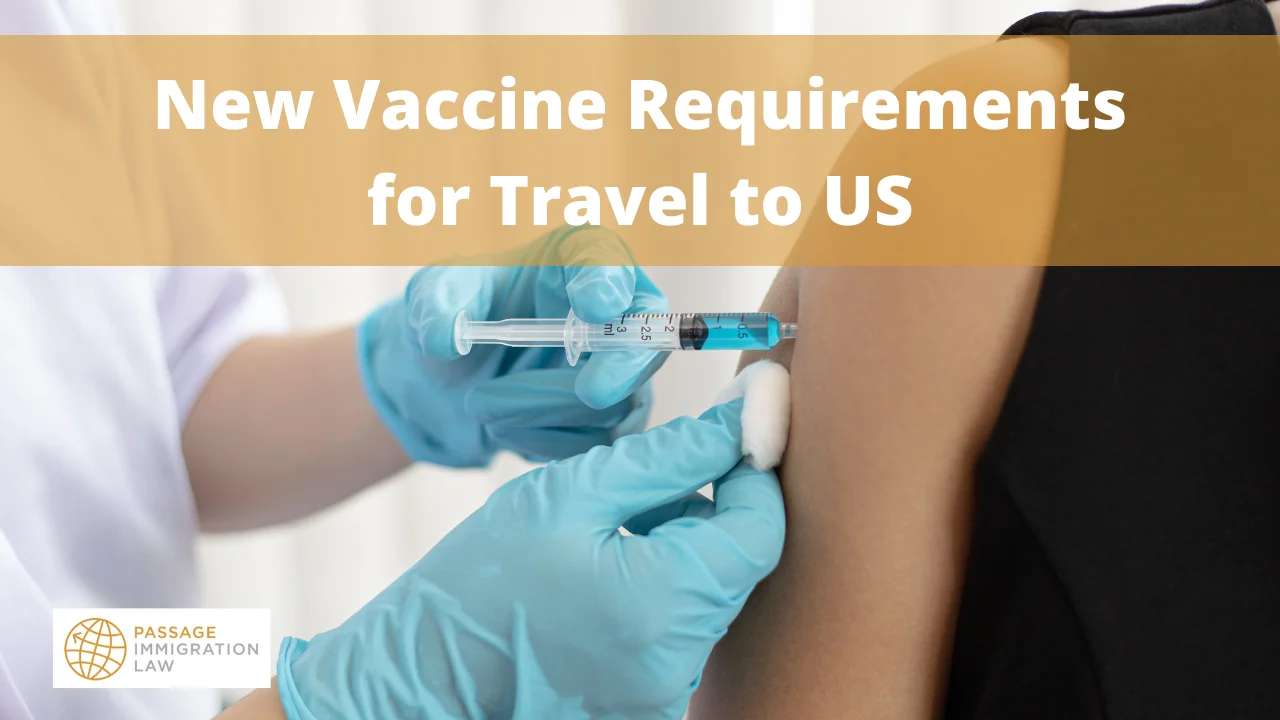On November 8, 2021, new COVID-19 travel guidelines will go into effect for travel to the United States, requiring all non-immigrant travelers be fully vaccinated against COVID-19, unless they meet one of the listed exception criteria. The new guidelines will apply to any traveler whose plane departs its destination at or after 12:01 AM Eastern time on November 8. If you are traveling to the United States on or after that date, make sure you have been fully vaccinated or can prove that you meet one of the exceptions. If you have not been fully vaccinated and none of the exceptions apply to you, you will have to adjust your travel plans.
The White House announced this change on October 25, 2021. The CDC has provided detailed guidance on approved vaccines, acceptable proof of vaccination status, the full list of exceptions, and more (all of which can be found here). If you have additional questions about required documentation specific to your country, we recommend that you contact your airline for guidance.
This universal vaccine requirement means that there are no longer country-wide bans for travelers coming from China, Iran, the Schengen Area, UK and Ireland, Brazil, South Africa, and India. If you are traveling from one of the previously-restricted countries and have been fully vaccinated, you can resume travel to the United States starting on November 8.
The new vaccine requirement does not apply to those who are already US citizens or lawful permanent residents. However, as of October 1, 2021, new immigrants who are applying for an Immigrant Visa or Adjustment of Status an approved COVID-19 vaccine will be included along with other standard, previously-required vaccines. There are several exceptions, notably for Immigrant Visa applicants whose countries of origin do not have approved vaccines widely available. You can learn more about vaccine requirements for immigrants on the CDC website or by watching our recent YouTube video.
Accepted Vaccines for Travel to the United States
Most foreign nationals entering the United States as a tourist or on a non-immigrant visa must present proof of vaccination. The United States will accept a wider range of vaccines than those approved by the U.S. Food & Drug Administration (FDA) (i.e., Pfizer BioNTech, Janssen, Moderna) and include all World Health Organization vaccines, like AstraZeneca, Sinovac, Covishield, and Sinopharm. Currently, the Sputnik vaccine is not approved by the WHO and therefore not accepted for travel.
US Permanent Residents (i.e., Green Card holders) are not subject to the vaccination requirements to enter the United States. However, there are certain testing requirements set for travel.
Exemptions from the Vaccine Requirements for Travel to the United States
The US officials have published a list of exemptions from the vaccination requirements. This list includes:
- People under the age of 18
- Anyone who can prove a medical reason that they cannot be vaccinated against Covid-19
- Anyone from a country that has limited (<10%) vaccine coverage
- Anyone given a humanitarian exception to enter the United States
- If someone is deemed in the national interest of the United States
- Certain exemptions for military families, diplomats, and sea crew.
There are currently 50 countries where poor vaccine coverage exempts arrivals from providing proof of vaccination at the border. The list will change as vaccination rates rise. There is also still a requirement for these people to get vaccinated once entered the United States. This exemption does not apply to anyone on a B-1 or B-2 Visa.
L-1 and E-2 Visa applications are categorized as “non-immigrant visas” and are, therefore, not exempt from the vaccine requirement. If you are currently inside the United States on one of those visas and subsequently travel outside from the country and attempt to return, you will have to present proof of vaccination status. If you are currently outside the United States with an approved or pending E-2 Visa or L1 Visa application, you will need to show evidence of vaccination.
It is unclear how long the requirements for Covid-19 vaccinations will remain in place. The processing times for non-immigrant visa application are usually comparatively quick. Since Covid-19 has caused shutdowns and slowdowns at US embassies and at the U.S. Citizenship & Immigration Services (USCIS), processing times have gotten longer. For anyone considering an application today, current waiting times will likely exceed the vaccine rules. As with everything during Covid-19, uncertainty abounds.
Consult with an Experienced Immigration Lawyer
Under US immigration laws, a foreign national applying for an immigrant visa or seeking adjustment of status to become a legal permanent resident is required to present documentation showing the receipt of particular vaccines. We assist people who seek a waiver of this requirement by helping with the preparation of the required document, a Form I-601, Application for Waiver of Grounds of Inadmissibility, along with your immigration petition to the United States Citizenship and Immigration Services (USCIS).
Passage Immigration Law can handle all your immigration requirements, but we have a special expertise in helping individuals who seek to avoid vaccination because of religious beliefs or moral convictions.
Passage Immigration Law also helps with medical exemptions for those who qualify. Grounds for a medical exemption can no vaccine having been approved for your age group, a contraindication to a vaccine, or having not had enough time to complete an entire vaccine series. Get your initial consultation today at (503) 427-8243 or schedule a consultation here.







